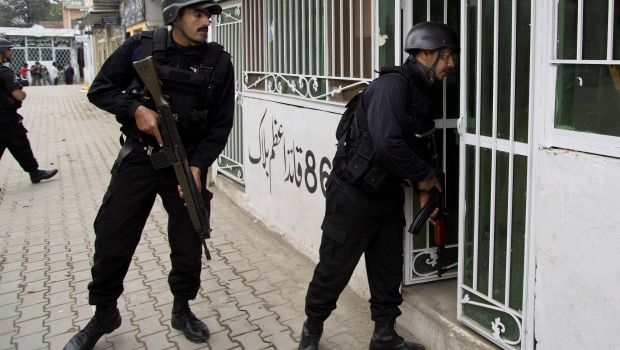
Pakistani police commandos search inside lawyers offices looking for attackers following a suicide attack in a court complex, in Islamabad, Pakistan, Monday, March 3, 2014. (AP Photo/B.K. Bangash)
No one immediately claimed responsibility for the assault, which came just days after the Pakistani Taliban announced a one-month ceasefire, raising questions about the group’s ability to control its various factions. Prime Minister Nawaz Sharif has been trying to negotiate a peace settlement with militants in the northwest who have waged a bloody war against the government for years.
Witnesses spoke of attackers wielding automatic weapons running into the narrow alleyways in the sleepy capital’s court complex, hurling grenades and opening fire indiscriminately on lawyers, judges and court personnel.
One lawyer described it as a scene from hell, with blasts and firing all around. “My colleague was shot, and there was no one to help him. When I reached him, he was bleeding and crying for help,” said Momin Ali.
There were conflicting reports on how many attackers were involved in the incident and if any of them had managed to escape from the police. It also remained unclear if anyone had been arrested, how the attackers penetrated so deep into the city and whether a specific person in the complex was the intended target.
Initial reports suggested two men wearing explosive vests rushed into the court complex, threw hand grenades and started shooting, then blew themselves up, said Islamabad Police Chief Sikander Hayat. He put the death toll at 11.
“It was certainly an act of terrorism,” Hayat said. One of the attackers blew himself up outside the office of the lawyers’ union president and the other outside the door of a judge’s office, he added.
The explosions sent lawyers and judges running in fear for their lives as police stormed in. Police subsequently searched the entire complex and found no additional attackers, said Hayat.
Other officials and a lawyer on the scene said there were more than two attackers. Police official Jamil Hashmi said there were about six to eight attackers who spread into different areas of the court complex.
“One of the attackers entered a courtroom and shot and killed a judge,” Hashmi said.
Lawyer Murad Ali said he saw several attackers walking toward a courtroom, brandishing weapons.
“They had automatic weapons. They had hand grenades,” he said. “I saw them shooting a female lawyer.”
His hands were splattered in blood that he said came from helping remove four dead bodies. Another lawyer, Sardar Gul Nawaz, said the attackers had short beards and wore shalwar kameez, a traditional Pakistani outfit of baggy pants and a long tunic.
The dead included two judges and five lawyers, said Dr. Altaf at the Pakistan Institute of Medical Sciences in Islamabad where the dead and wounded were taken. Altaf, who spoke to television reporters and only gave his family name, said most of the victims had bullet wounds. He said 25 were wounded, five of them critically.
The area where the attack occurred is a warren of walkways filled with judges’ chambers, lawyers’ offices and restaurants and businesses catering to the legal community. The walkways are filled with copying machines for clerks and clients to make copies of legal documents, and prisoners wearing chains can often be seen walking through the complex on their way to and from court.
Families of suspects on trial also often stand around the area, waiting for their loved ones to appear in court. Some spots in the complex have metal detectors, which are often not used.
Pakistani television showed images of the area with windows blown out, walls torn and lawyers in traditional black suits carrying what appeared to be lifeless bodies and wounded from the buildings. Policemen with weapons raised ran through the area and searched offices.
Body parts and blood mingled with pieces of shattered glass littered the ground outside the courtrooms and attorney’s offices. The police cordoned off the complex, which was taken over by commandos from the police anti-terrorist force.
The attack was a shock to Islamabad, which has mostly been spared the frequent bombings and shootings prevalent in other parts of Pakistan such as Peshawar near the tribal areas or the port city of Karachi.
The peace process has proceeded in fits and starts but seemed to get a boost on Saturday, when the Pakistani Taliban announced they would implement a one-month ceasefire after the military pounded their hideouts with airstrikes.
The militant group was quick to distance itself from Monday’s attack. A spokesman for the organization in a telephone call to an Associated Press reporter said the group was not involved in the assault and restated his group’s commitment to the ceasefire.
But the attack highlighted the difficulty in negotiating a peace deal with a multi-faceted group like the Pakistani Taliban, made up of varying factions. Analysts say that while some in the group may want to negotiate a peace deal, other factions may not, making it difficult to enforce a peace deal across all the factions. The cease-fire did not include other groups, such as Al-Qaeda, that operate in Pakistan.
